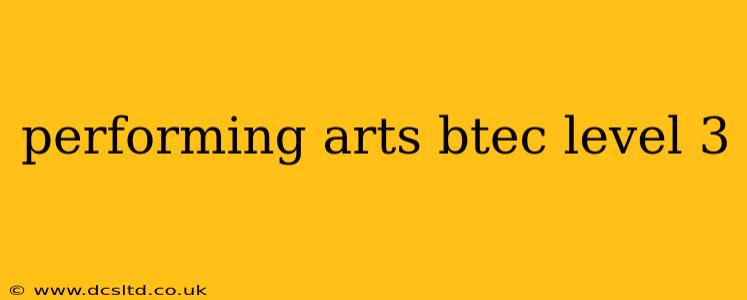The BTEC Level 3 Extended Diploma in Performing Arts is a highly respected qualification, offering a comprehensive pathway into the exciting world of theatre, dance, and music. This guide will delve into the intricacies of this program, answering common questions and providing valuable insights for prospective and current students. Whether you're dreaming of a West End stage, a Broadway debut, or a career behind the scenes, understanding the BTEC Level 3 Performing Arts course is crucial.
What is a BTEC Level 3 Extended Diploma in Performing Arts?
The BTEC Level 3 Extended Diploma in Performing Arts is a vocational qualification that provides a practical, industry-focused approach to learning. Unlike A-Levels, which are more theoretical, BTEC emphasizes hands-on experience, practical skills development, and real-world application. The course equips students with the technical and performance skills needed for a career in the performing arts, alongside essential business and industry knowledge. It's equivalent to 3 A-Levels and is highly regarded by universities and employers.
What subjects are covered in a BTEC Level 3 Performing Arts course?
The specific modules can vary slightly between colleges, but generally, you can expect a blend of practical and theoretical subjects, including:
- Acting: Developing performance skills, exploring different acting techniques (e.g., Stanislavski, Meisner), and working on character development.
- Dance: Training in various dance styles (e.g., ballet, contemporary, jazz), learning choreography, and improving technique.
- Musical Theatre: Combining singing, acting, and dance skills in musical theatre performances.
- Technical Theatre: Understanding stage management, lighting design, sound design, and other technical aspects of theatre production.
- Applied Theatre: Exploring different forms of theatre practice and their applications in diverse contexts.
- Music: Developing musical skills, learning music theory, and potentially performing with an ensemble.
What are the entry requirements for a BTEC Level 3 Performing Arts course?
Entry requirements vary between colleges. Typically, you'll need at least 5 GCSEs at grade 4 or above (or equivalent), including English and maths. Some colleges might also require auditions or interviews to assess your potential and passion for performing arts. Check directly with the colleges you're interested in for their specific requirements.
What are the career prospects after completing a BTEC Level 3 Performing Arts course?
A BTEC Level 3 in Performing Arts opens doors to a range of exciting career paths. Graduates can pursue roles as:
- Actors: Working in theatre, film, television, or other performance mediums.
- Dancers: Performing in professional dance companies, musicals, or other productions.
- Musicians: Performing in bands, orchestras, or as solo artists.
- Stage Managers: Coordinating and managing all aspects of a theatre production.
- Lighting Designers: Designing and operating lighting for stage productions.
- Sound Designers: Designing and operating sound for stage productions.
- Technical Theatre Crew: Working behind the scenes in various technical roles.
What is the difference between a BTEC and an A-Level in Performing Arts?
While both qualifications are valuable, they offer different learning approaches. A-Levels are more academically focused, often involving essays and written examinations. BTECs, conversely, are more practical, emphasizing hands-on experience and vocational skills. The choice depends on your learning style and career aspirations. A BTEC is often a better choice for those who prefer a practical, skills-based approach to learning.
Can I go to university after completing a BTEC Level 3 Performing Arts course?
Yes, absolutely! A BTEC Level 3 Extended Diploma is highly regarded by universities, and many offer pathways to higher education. You can use it to apply for a wide range of undergraduate courses, including those related to performing arts, theatre studies, drama, dance, music, and related subjects. Many universities accept BTECs as equivalent to A-Levels for entry.
What kind of assessments are involved in a BTEC Level 3 Performing Arts course?
Assessment methods vary but generally include a mixture of:
- Practical Performances: Demonstrating your skills through acting, dancing, singing, and technical theatre work.
- Portfolios: Showcasing your work, including scripts, choreography, designs, and evaluations.
- Written Assignments: Demonstrating your understanding of theoretical concepts and industry practices.
- Presentations: Presenting your research, analysis, and creative work.
This blended approach assesses both practical skills and theoretical understanding.
This detailed overview should provide a comprehensive understanding of the BTEC Level 3 Performing Arts course. Remember to research different colleges and their specific program offerings to find the best fit for your ambitions. Good luck!
